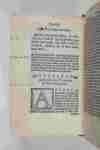University of Auckland Public Lecture: Magna Carta – Visions for the Future: Friday 10 July 2015, 6:45pm, Business School/Owen G Glenn Building
How does Magna Carta’s past inform our expectations of the future? What challenges await?
This was part of The University of Auckland’s week long public lecture series for the 800th anniversary of Magna Carta organised by Dr Stephen Winter from Politics and International Relations.
Two copies of the Magna Carta from Canterbury and Auckland were on display during this lecture. Photo’s can be seen below.
.
Transcripts
Chair: Dr Stephen Winter, Politics and International Relations, University of Auckland (click here to view the transcript for the video)
Speakers
Dr Chris Jones, Senior Lecturer in History, University of Canterbury (click here to view the transcript for the video)
Dr Chris Jones is a specialist in medieval European history and keen to demonstrate the relevance of history to modern society. He is a member of the Magna Carta 800th committee for New Zealand and is organising our last anniversary event in 2015: Magna Carta themed panels at the NZ Historical Association in Canterbury in December. Dr Jones has recently been elected president of the Australia/NZ association of medievalists and early modernists. He is a Fellow of the UK Royal Historical Society and was previously a member of the Council Member of the Medieval Association of the Pacific.
Patrick Reilly, Acting High Commisioner, British High Commission New Zealand (click here to view the transcript for the video)
 Patrick Reilly took up post as Deputy Head of Mission at the British High Commission in Wellington in January 2011. He joined the Foreign and Commonwealth Office in the mid-1990s and worked on the conflict in the former Yugoslavia before being posted to South Africa as a political officer. From 2000 he worked on European Union internal policy before being posted to Dublin as First Secretary working on the Northern Ireland peace process. In 2006 Patrick led the UK team responsible for the negotiation and ratification of the EU Lisbon Treaty. He then became Deputy Head of Afghanistan Department. Patrick was appointed first head of the National Security Council Secretariat in May 2010.
Patrick Reilly took up post as Deputy Head of Mission at the British High Commission in Wellington in January 2011. He joined the Foreign and Commonwealth Office in the mid-1990s and worked on the conflict in the former Yugoslavia before being posted to South Africa as a political officer. From 2000 he worked on European Union internal policy before being posted to Dublin as First Secretary working on the Northern Ireland peace process. In 2006 Patrick led the UK team responsible for the negotiation and ratification of the EU Lisbon Treaty. He then became Deputy Head of Afghanistan Department. Patrick was appointed first head of the National Security Council Secretariat in May 2010.
Andrew Little, Leader of the New Zealand Labour Party (click here to view the transcript for the video)
Andrew Little is the current Leader of the New Zealand Labour Party. He was elected to Parliament in 2011. His first job was as a solicitor for the Engineers Union (later EPMU), becoming National Secretary of the EPMU in 2000. He was elected President of the Labour party in 2009 and has served on the boards of VUW, TEC, and WITT (Taranaki Polytechnic). Since becoming an MP he has held the ACC, Tourism, Justice and Labour portfolios, lobbying for a reversal of legal aid cuts, the introduction of corporate manslaughter laws to increase accountability in cases such as the Pike River disaster and the creation of a criminal cases review commission to review alleged miscarriages of justice. He also helped develop new policy to improve the rights of sexual assault victims.
Johanna McDavitt, JustSpeak (click here to view the transcript for the video)
Johanna McDavitt is a representative from the Auckland branch of JustSpeak. JustSpeak is a network of young people speaking to, and speaking up, for a new generation of thinkers who want change in our criminal justice system. JustSpeak seeks to create a safer and more just Aotearoa by minimising imprisonment, enabling better rehabilitation for offenders, and focusing on the social problems that lead to offending. Johanna will talk about how the principles of the magna carta can inform present-day debate and reform in the criminal justice sector.
Q&A (click here to view the transcript for the video)



